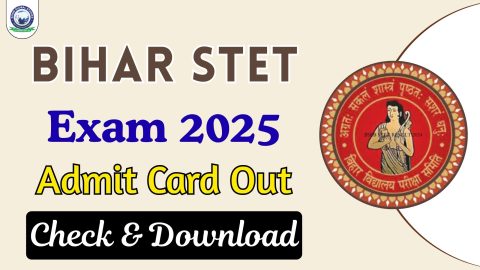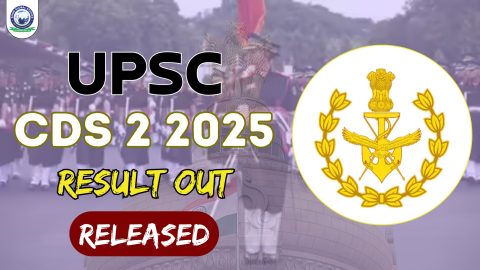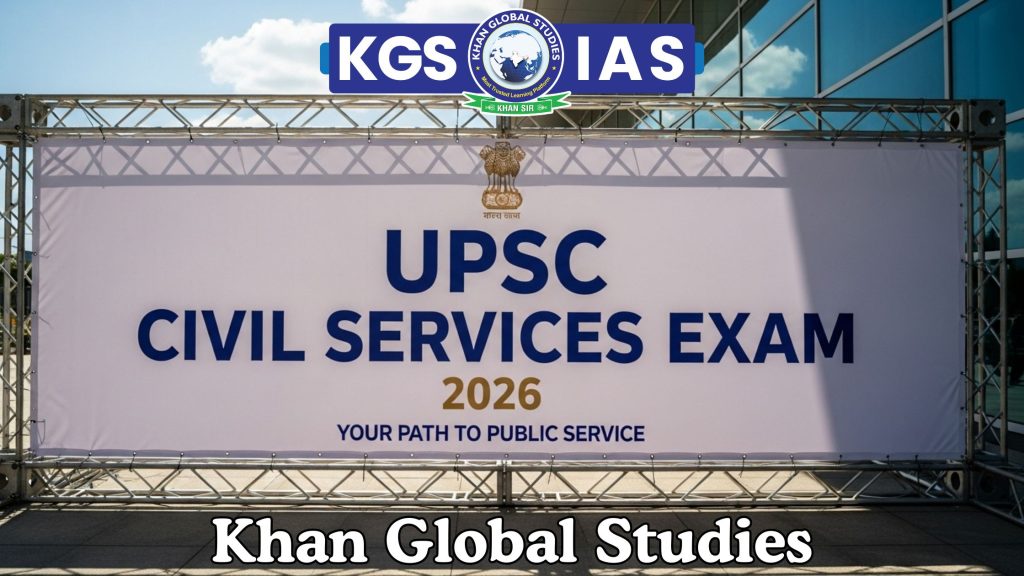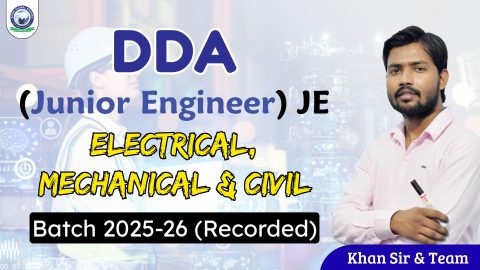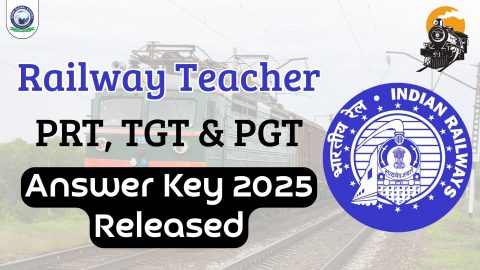UPSC Civil Services Examination 2026-27: Have you ever seen a District Magistrate on TV or in your town and thought, “Wow, I want to do that”? Or maybe you’ve heard friends and family talking in hushed, respectful tones about the “IAS exam.” You’ve probably wondered what it’s all about, how it works, and if it’s something you could ever do.
Well, you’ve come to the right place. Think of this as your friendly, no-nonsense guide to one of the most prestigious and challenging exams in India: the UPSC Civil Services Examination (CSE). We’re going to break it all down, piece by piece, in simple terms. No confusing jargon, no complicated explanations. Just a straight-forward chat about what this exam is, who can take it, and what it takes to succeed.
The Union Public Service Commission (UPSC) Civil Services Examination (CSE) is one of India’s most prestigious and competitive exams. Thousands of aspirants from across the country aim to secure a spot in India’s civil services, which include roles like the Indian Administrative Service (IAS), Indian Police Service (IPS), and Indian Foreign Service (IFS). But what exactly is the UPSC exam, and why do so many individuals dedicate years of hard work to cracking it? Let’s dive deeper into all aspects of the UPSC Civil Services Examination.
Let’s dive in and demystify the journey to becoming a top government officer in India.
UPSC Civil Services Examination Key Takeaways
Before we get into the nitty-gritty, here’s a quick snapshot of what you absolutely need to know:
- What it is: The UPSC Civil Services Examination is a national exam in India used to recruit candidates for top-tier government jobs, including the Indian Administrative Service (IAS), Indian Police Service (IPS), and Indian Foreign Service (IFS).
- The Three-Stage Challenge: The exam is a marathon, not a sprint. It consists of three tough stages: the Preliminary Exam (Prelims), the Main Exam (Mains), and the Personality Test (Interview). You have to clear each stage to move to the next.
- Who Conducts It: The Union Public Service Commission (UPSC), an independent body of the Indian government, is responsible for running this exam fairly and smoothly.
- Who Can Apply: You just need a bachelor’s degree from a recognized university, be an Indian citizen (for most services), and fall within the specific age limits.
- Why It’s So Tough: The syllabus is massive, covering everything from ancient history to modern science and international relations. Plus, millions of people apply for just a few hundred spots, making the competition incredibly fierce.
What Is the UPSC Civil Services Examination, Really?
Let’s start with the basics. The UPSC Civil Services Examination is like the ultimate talent search for the Indian government. The government needs smart, dedicated, and responsible people to run the country, make important decisions, and manage various departments. This exam is the process they use to find those people.
Think of the “Civil Services” as the backbone of the country’s administration. These are the officials who work behind the scenes (and sometimes in the spotlight) to implement policies, maintain law and order, and represent India on the world stage. From managing a district to negotiating treaties with other countries, civil servants do it all.
The exam itself is designed to test not just your knowledge but also your character, your decision-making skills, and your ability to handle pressure. It’s a comprehensive test of your mind and personality.
The Allure of the UPSC Civil Services: Why Do Millions Apply?
You might be wondering, “Why would anyone put themselves through such a grueling process?” That’s a great question. The answer lies in the unique combination of prestige, power, and purpose that a career in the civil services offers.
- A Chance to Make a Real Difference: This is the biggest draw for many. As a civil servant, your decisions can directly impact the lives of thousands, even millions, of people. You could be working on projects related to education, healthcare, infrastructure, or poverty alleviation. It’s a job where you can see the tangible results of your hard work.
- Job Security and Stability: Let’s be practical. Government jobs, especially at this level, offer unparalleled job security. You’re not at the mercy of market fluctuations or company layoffs. This stability allows you to focus on your work without constant worry.
- Prestige and Respect: In Indian society, becoming an IAS or IPS officer is a huge achievement. The position commands immense respect and social standing. It’s seen as a noble profession dedicated to serving the nation.
- Variety and Challenge: A career in the civil services is anything but boring. You get transferred to different departments and regions throughout your career, giving you a chance to learn new things and face new challenges. One day you could be managing election logistics, and the next you might be overseeing disaster relief efforts.
The Jobs on Offer: More Than Just IAS and IPS
When people talk about the UPSC exam, the terms “IAS” and “IPS” are thrown around the most. While they are certainly the most well-known, the Civil Services Examination is actually a gateway to over 20 different top-level services.
These services are broadly categorized into two groups:
- All India Services:
- Indian Administrative Service (IAS): These are the top administrators. They hold key posts in the central government, state governments, and public-sector companies. The District Magistrate (DM) or District Collector is an IAS officer.
- Indian Police Service (IPS): Responsible for law and order, crime prevention, and public safety. The Superintendent of Police (SP) in a district is an IPS officer.
- Indian Forest Service (IFoS): They manage the country’s forests and wildlife. (Note: The IFoS has a slightly different exam process, but the Prelims are the same as the CSE).
- Central Services (Group A & Group B): These officers work under the central government in various specialized departments. Some of the prominent ones include:
- Indian Foreign Service (IFS): These are India’s diplomats. They represent the country abroad, work in embassies, and handle international relations.
- Indian Revenue Service (IRS): These officers are responsible for collecting taxes, like income tax and customs duties.
- Indian Audit and Accounts Service (IAAS): They work as auditors for the government, ensuring public money is spent correctly.
- Indian Railway Traffic Service (IRTS): They manage the operations and commercial aspects of the Indian Railways.
And many more! When you clear the exam, you get to rank these services in order of your preference. Your final rank and category determine which service you are allotted.
Are You Eligible? Let’s Check the Boxes
Before you start dreaming about your future office, it’s important to know if you can even take the exam. The eligibility criteria set by UPSC are quite straightforward.
1. Nationality
- For the IAS, IPS, and IFS, you must be a citizen of India.
- For other services, citizens of Nepal, Bhutan, and Tibetan refugees who came to India before January 1, 1962, are also eligible, along with certain persons of Indian origin who have migrated from specific countries. But for most aspirants, the rule is simple: you need to be an Indian citizen.
2. Education
- You must hold a bachelor’s degree (like a BA, B.Sc, B.Com, B.Tech, MBBS, etc.) from any university recognized by the University Grants Commission (UGC).
- It doesn’t matter what you studied or what your grades were. A student who barely passed is just as eligible as a gold medalist.
- Even students in the final year of their degree can apply, but they must be able to produce their final degree certificate by the time of the Main examination.
3. Age Limit
- You must be at least 21 years old on August 1st of the year of the examination.
- The upper age limit is 32 years.
- However, there are relaxations in the upper age limit for certain categories:
- OBC (Other Backward Classes): Up to 35 years.
- SC/ST (Scheduled Castes/Scheduled Tribes): Up to 37 years.
- Disabled Persons: Up to 42 years.
4. Number of Attempts
There’s a limit to how many times you can take the exam.
- General Category: 6 attempts until the age of 32.
- OBC: 9 attempts until the age of 35.
- SC/ST: Unlimited attempts until the age of 37.
Appearing for even one paper in the Preliminary Exam counts as an attempt. So, if you fill out the form but don’t show up for the exam, it’s not counted as an attempt.
The Three-Stage Gauntlet: Understanding the Exam Pattern
Okay, now for the main event. The UPSC CSE is a three-act play. You need to perform well in each act to get to the finale.
Stage 1: The Preliminary Exam (The Great Filter)
The Prelims is the first hurdle. It’s usually held in May or June. Millions of people apply, but only about 10,000 to 15,000 make it to the next stage. Its main purpose is to weed out non-serious candidates and select a smaller group for the Main exam.
The Prelims consists of two papers, both held on the same day. Both papers are multiple-choice question (MCQ) based.
- Paper I: General Studies (GS)
- Marks: 200
- Questions: 100
- Duration: 2 hours
- Syllabus: This paper covers a vast range of topics: History, Geography, Polity (the Indian political system), Economy, Science & Technology, Environment, and Current Affairs.
- What it does: The score you get in this paper determines whether you qualify for the Mains. You need to score above the cut-off mark, which varies each year depending on the difficulty of the paper and the number of vacancies.
- Negative Marking: Be careful! For every wrong answer, one-third (0.66) of the marks assigned to that question will be deducted.
- Paper II: Civil Services Aptitude Test (CSAT)
- Marks: 200
- Questions: 80
- Duration: 2 hours
- Syllabus: This paper tests your aptitude. It includes reading comprehension, logical reasoning, analytical ability, decision-making, and basic numeracy (maths up to Class 10 level).
- What it does: This paper is only qualifying in nature. You just need to score a minimum of 33% (which is 66 marks out of 200) to pass. Its marks are not added to your final score for Prelims. However, if you don’t clear this 33% cut-off, your GS Paper I won’t even be evaluated.
- Negative Marking: Yes, this paper also has negative marking.
So, the Prelims strategy is simple: score as high as possible in Paper I while making sure you comfortably clear the 33% bar in Paper II.
Stage 2: The Main Examination (The Real Test of Knowledge)
If you clear the Prelims, congratulations! You’ve made it to the Main exam, which is usually held around September or October. This is where your deep knowledge and writing skills are put to the test. Unlike the Prelims, the Mains is a descriptive, essay-style written exam.
The Main Exam consists of 9 papers spread over about 5 days.
The papers are divided into two types: qualifying and merit-based.
Qualifying Papers (You just need to pass these):
- Paper A: Indian Language: You have to choose one Indian language from the list in the Eighth Schedule of the Constitution (like Hindi, Tamil, Bengali, etc.) and write an exam. This is a basic language test.
- Paper B: English: A basic English language test.
For both these papers, you just need to score the minimum qualifying marks (usually 25%). The marks from these papers are not counted in your final ranking.
Merit Papers (These are the ones that count!):
Each of these seven papers is for 250 marks, making the total written exam score 1750 marks.
- Paper I: Essay: You’ll be given a few topics and you have to write two long essays. This tests your ability to think coherently, organize your thoughts, and express yourself clearly.
- Paper II: General Studies I (GS-1): Covers Indian Heritage and Culture, History, and Geography of the World and Society.
- Paper III: General Studies II (GS-2): Covers Governance, Constitution, Polity, Social Justice, and International Relations.
- Paper IV: General Studies III (GS-3): Covers Technology, Economic Development, Bio-diversity, Environment, Security, and Disaster Management.
- Paper V: General Studies IV (GS-4): This is the Ethics, Integrity, and Aptitude paper. It tests your ethical approach to problem-solving using case studies.
- Paper VI: Optional Subject – Paper 1: You get to choose one optional subject from a long list (like History, Sociology, Public Administration, Physics, etc.). This paper covers the first half of that subject’s syllabus.
- Paper VII: Optional Subject – Paper 2: This paper covers the second half of your chosen optional subject’s syllabus.
The total marks from these 7 papers (7 x 250 = 1750) determine whether you get a call for the interview.
Stage 3: The Personality Test (The Final Hurdle)
If you clear the cut-off for the Main exam, you’ll be invited to Delhi for the final stage: the Personality Test, more commonly known as the Interview. This is usually conducted between February and April.
- Marks: 275
- What it is: This is not a typical job interview. It’s a conversation with a board of experienced and knowledgeable people. They are not just testing your knowledge (that was already done in the Mains). They are assessing your personality.
- What they look for: They want to see if you are suitable for a career in public service. They check your mental alertness, critical thinking, clear and logical exposition, balance of judgment, variety and depth of interest, social cohesion, and leadership potential. They want to know if you are honest, humble, and have a positive attitude.
- How it works: You sit in front of a board of 5-6 members, including the chairperson. They will ask you questions about your background (your education, hobbies, work experience), your opinion on current events, and hypothetical situations to see how you would react.
The Final Result:
Your final rank is determined by combining your marks from the Main Examination (1750 marks) and the Personality Test (275 marks). The total score is out of 2026 marks.
Based on your final rank and the preferences you filled out, you will be allocated a service and a cadre (the state where you will work).
Decoding the Syllabus: What Do You Actually Need to Study?
The UPSC syllabus is famously vast. It’s often said that you need to know “everything under the sun.” While that’s an exaggeration, it’s not far from the truth. The key is to understand the structure and focus on the important areas.
Here’s a simplified breakdown:
For Prelims (GS Paper I):
- Current Affairs: What’s happening in India and around the world in the last year or so.
- History of India: Ancient, Medieval, and Modern (with a special focus on the Indian National Movement).
- Geography: Indian and World Geography (physical, social, and economic).
- Indian Polity and Governance: The Constitution, political system, Panchayati Raj, public policy, etc.
- Economic and Social Development: Sustainable development, poverty, inclusion, demographics, etc.
- General Science & Environment: Basic science, ecology, bio-diversity, and climate change.
For Mains (GS Papers I-IV):
- GS-I goes deeper into Indian history, culture, world history, and geography. It also includes topics on Indian society.
- GS-II is all about the Indian Constitution in detail, the functioning of the government, social justice issues (like health and education), and India’s relationship with other countries.
- GS-III focuses on the Indian economy, agriculture, science and technology, environmental issues, and internal security challenges (like terrorism and cyber-security).
- GS-IV is the ethics paper. It’s less about memorizing facts and more about understanding concepts like honesty, integrity, and emotional intelligence, and applying them to real-life situations.
Optional Subject:
This is a deep dive into one subject of your choice, almost at a post-graduate level. Choosing the right optional is a critical decision in your preparation journey.
Crafting a Winning Strategy: Some Friendly Advice
Preparing for the UPSC CSE is a marathon that requires patience, discipline, and a smart plan. Here are a few tips to get you started:
- Start with the Basics: Before you jump into thick, complicated books, start with the NCERT textbooks from Class 6 to 12. They are written in simple language and build a strong foundation for all the GS subjects.
- Read the Newspaper Daily: This is non-negotiable. Reading a good national newspaper (like The Hindu or The Indian Express) every day is crucial for both Prelims and Mains. It keeps you updated on current affairs and helps you develop your own opinions on various issues.
- Choose Your Optional Subject Wisely: Don’t just pick a subject because it’s popular or someone else scored well in it. Choose a subject that you are genuinely interested in, have some background in, or for which good study material is available. You’ll be spending a lot of time with it, so you better like it!
- Make Your Own Notes: Don’t just read; engage with the material. Making your own concise notes helps in understanding and, more importantly, in revising. The syllabus is too vast to re-read entire books before the exam.
- Practice, Practice, Practice:
- For Prelims: Solve as many mock test papers as you can. This helps you manage time, improve accuracy, and get used to the pressure of the exam hall.
- For Mains: Writing practice is key. You need to be able to write clear, well-structured answers quickly. Start by writing answers to previous years’ questions and get them reviewed by seniors or mentors.
- Stay Healthy and Motivated: This is a long and often lonely journey. It’s easy to burn out. Make sure you eat well, get enough sleep, and exercise regularly. Take short breaks to relax and recharge. Talk to friends and family who support you.
How to Prepare for the UPSC Civil Services Examination
Preparing for the UPSC exam requires a combination of smart study techniques, discipline, and perseverance. Here’s a step-by-step guide:
1. Understand the Syllabus Thoroughly
The first step in preparing for the UPSC exam is understanding the syllabus. The syllabus is vast, so it’s essential to break it down into manageable parts. Focus on the core topics in General Studies and your chosen optional subject.
2. Choose the Right Study Material
There are tons of UPSC preparation books and materials available, but not all are necessary. Stick to trusted sources like NCERT books for foundational concepts, and refer to standard books for advanced topics in General Studies.
3. Time Management
Efficient time management is crucial. Make a realistic timetable that allows time for revision and practice. Don’t overburden yourself with too many tasks.
4. Current Affairs
UPSC gives significant weight to current affairs, particularly in the Prelims and Mains. Read newspapers daily and keep track of national and international news, government policies, and economic developments.
5. Practice Writing
The Mains exam is primarily a written exam. Focus on practicing writing clear, concise, and structured essays and answers. Regular practice will help improve your writing speed and quality.
6. Mock Tests and Previous Papers
Taking mock tests and solving previous years’ papers is essential. It helps you get a feel for the actual exam and improves your time management skills.
7. Stay Consistent and Motivated
The UPSC journey is long, and maintaining motivation can be challenging. It’s essential to stay consistent and take breaks to avoid burnout.
UPSC Civil Services: Role and Duties
Civil Services officers manage government administration, policy decisions, law and order, tax collection, diplomacy, disaster management, and more. They act as crucial links between government and public, bringing real-world change.
Key Points for Success
- Read the latest notification: Follow every UPSC instruction for the year.
- Honesty in the application: False information can get you debarred.
- Don’t miss deadlines: Applications close strictly on the announced date.
- Consistency: Steady, daily preparation wins the race.
How to Apply for the Exam
Applying is online. Go to the official portal. Fill in your details, upload photos and signatures. Pay the fee – it’s around 100 bucks for general folks, free for some categories.
Watch for notifications. They come out in February. Apply by March. Admit cards drop a few weeks before the exam.
If you need help, there are FAQs on the site.
Challenges and Realities of the Exam
It’s not all smooth. The competition is fierce. Only about 1,000 make it each year.
The syllabus is vast. You need discipline.
But the rewards? Power to change lives. Good pay, perks, and respect.
If you’re from a small town or first-gen, don’t hold back. Many succeed with hard work.
Quick Recap
- UPSC CSE = Prelims + Mains + Interview.
- Open to all Indian graduates aged 21–32 (with relaxations).
- Covers a broad syllabus: General Studies, essay, optional, languages.
- Application is entirely online.
- Dedication, the right strategy, and current awareness are secret weapons for success.
Best of luck to future leaders!
Common Mistakes to Avoid:
- Procrastination and irregular study patterns
- Over-dependency on coaching institutes
- Neglecting basic books for advanced materials
- Ignoring previous year question papers
- Inadequate current affairs preparation
- Poor time management during exams
Preparation Timeline:
For Beginners (1.5-2 years):
- First 6 months: Foundation building with NCERTs
- Next 6 months: Standard textbooks and current affairs
- Next 6 months: Intensive preparation and test series
- Final 6 months: Revision and answer writing practice
Resource Recommendations:
Newspapers: The Hindu, Indian Express Monthly Magazines: Yojana, Kurukshetra Online Platforms: Official government websites Books: Standard textbooks for each subject Current Affairs: Monthly compilations from reputable sources
The Final Word
The UPSC Civil Services Examination is more than just an exam; it’s a journey of immense learning and self-discovery. It will test your limits, challenge your beliefs, and push you to become the best version of yourself.
It’s a path filled with hard work, sacrifice, and moments of self-doubt. But for those who are driven by a passion to serve the country and make a real impact, it is a journey worth taking. Whether you succeed or not, the knowledge and discipline you gain along the way will stay with you for life.
So, if you have that spark, that dream of serving the nation from one of its highest offices, don’t be intimidated. Take the first step. Understand the exam, make a plan, and start your preparation. The path is long, but the destination is truly extraordinary.
Frequently Asked Questions (FAQs)
Let’s tackle some of the most common questions people have about the UPSC exam.
Is the UPSC exam very difficult?
Yes, it is considered one of the toughest exams in the world due to its vast syllabus and the intense competition. However, “difficult” does not mean “impossible.” Every year, hundreds of ordinary students with extraordinary determination crack it. It requires consistent hard work and a smart strategy more than just genius-level intelligence.
Can I crack the UPSC exam without coaching?
Absolutely! Many successful candidates have cleared the exam through self-study. With the amount of high-quality information, study material, and online lectures available today, coaching is no longer a necessity. It’s a personal choice. If you are disciplined and can create your own study plan, you can succeed without it.
What is the salary of an IAS officer?
The salary of an IAS officer at the entry-level is around Rs. 56,100 per month (basic pay), plus allowances like Dearness Allowance (DA), House Rent Allowance (HRA), and Travel Allowance (TA). The total monthly salary can be over Rs. 1 lakh at the beginning. But the real perks are not just the salary; they include a large house, a car, domestic help, and immense responsibility and power to do good.
How many hours a day should I study for UPSC?
There is no magic number. It’s about the quality of your study, not the quantity. Some people study for 6-8 hours a day, while others study for 10-12 hours. What’s important is to be consistent and to study effectively. It’s better to have 6 hours of focused, productive study than 12 hours of distracted, half-hearted reading.
Which degree is best for UPSC?
There is no “best” degree for UPSC. Candidates from all academic backgrounds—engineering, medicine, arts, commerce—succeed in this exam. The exam is designed to provide a level playing field. The best strategy is to choose a graduation subject you enjoy, as that could potentially become your optional subject later.
How many attempts are allowed for the General category?
For candidates in the General category, a maximum of 6 attempts are allowed until they reach the upper age limit of 32 years.
What is the age limit for UPSC Civil Services Examination?
The age limit for the UPSC exam is 32 years for general category candidates, with a relaxation for OBC, SC, and ST candidates. Age limits are subject to changes in UPSC guidelines.
How many attempts can a candidate make for the UPSC exam?
Candidates from the general category can attempt the exam up to six times, OBC candidates have nine attempts, while SC/ST candidates have unlimited attempts until they reach the upper age limit.
What are the best books for UPSC preparation?
Books like the NCERTs for basic concepts, and advanced books like ‘Indian Polity’ by M. Laxmikanth, ‘Modern History’ by Bipin Chandra, and ‘Geography’ by Majid Husain, are popular choices among UPSC aspirants.
How long does it take to prepare for UPSC?
The preparation time varies for every candidate. Most successful candidates spend about 1-2 years preparing full-time, but it depends on how much prior knowledge you have and your study pace.
Is coaching necessary for UPSC preparation?
Coaching can help in providing structured learning, but it is not mandatory. Many candidates successfully clear the exam through self-study.
What Is the UPSC Civil Services Examination?
It’s a test by UPSC to hire for civil services. It has prelims, mains, and interviews.
What Is the Eligibility for UPSC CSE?
You need a degree, be 21-32 years old, and meet nationality rules. Attempts vary by category.
What Is the Age Limit for UPSC?
21 to 32 for general. Relaxations for reserved categories up to 37 or more.
How Many Attempts Are Allowed in UPSC?
6 for general, 9 for OBC, unlimited for SC/ST until age limit.
What Is the Exam Pattern for UPSC CSE?
Prelims: 2 papers, objective. Mains: 9 papers, descriptive. Interview: 275 marks.
What Is the Syllabus for UPSC Prelims and Mains?
Prelims: GS and CSAT. Mains: Essays, GS papers, optionals, languages.
When Is the UPSC Exam Conducted?
Prelims in May-June, mains in September-October, interview in March-April.
How Can I Prepare for UPSC at Home?
Read NCERTs, newspapers. Make notes. Practice tests. Use online resources.
There you have it! If you’re serious about UPSC, start today. It’s a journey, but one that can change your life
Is UPSC really tough?
Yes, but not impossible. With the right strategy and mindset, many crack it every year.
How many hours should I study daily?
Quality matters more than quantity. 6–8 focused hours are usually enough.
Can I prepare while working?
Yes, but it requires discipline. Many working professionals have cleared UPSC.
Which optional subject is best?
There’s no “best.” Choose what you’re comfortable with and can score well in.
Is coaching necessary?
Not mandatory. Many toppers have succeeded through self-study.
What is the 7-5-3 rule in UPSC?
The 7-5-3 technique helps structure mains answers effectively:
- 7 points in the body of your answer
- 5 paragraphs total (Introduction, 3 body paragraphs, Conclusion)
- 3 dimensions to every answer (what, why, how)
How difficult is the UPSC exam?
The UPSC Civil Services Examination is considered one of the world’s toughest competitive exams due to:
- Extensive syllabus covering multiple subjects
- Subjective evaluation in mains
- Unpredictable question patterns
- High competition with over 10 lakh applicants annually
- Need for deep understanding rather than rote learning
Can I attempt UPSC without coaching?
Yes, many successful candidates clear UPSC through self-study. However, coaching can provide:
- Structured guidance
- Regular test series
- Peer interaction
- Expert mentorship
What is the success rate of UPSC?
The UPSC success rate is approximately 0.078%, meaning less than 1 in 1000 candidates succeed. In 2023, around 1000 candidates were selected from over 13 lakh registrations.
When should I start preparing for UPSC?
Most successful candidates take 1-2 years of dedicated preparation. Starting early allows for:
- Thorough syllabus coverage
- Multiple revision cycles
- Current affairs compilation
- Practice and improvement
Read more: Latest UPSC Current Affairs magazine 2026-27
